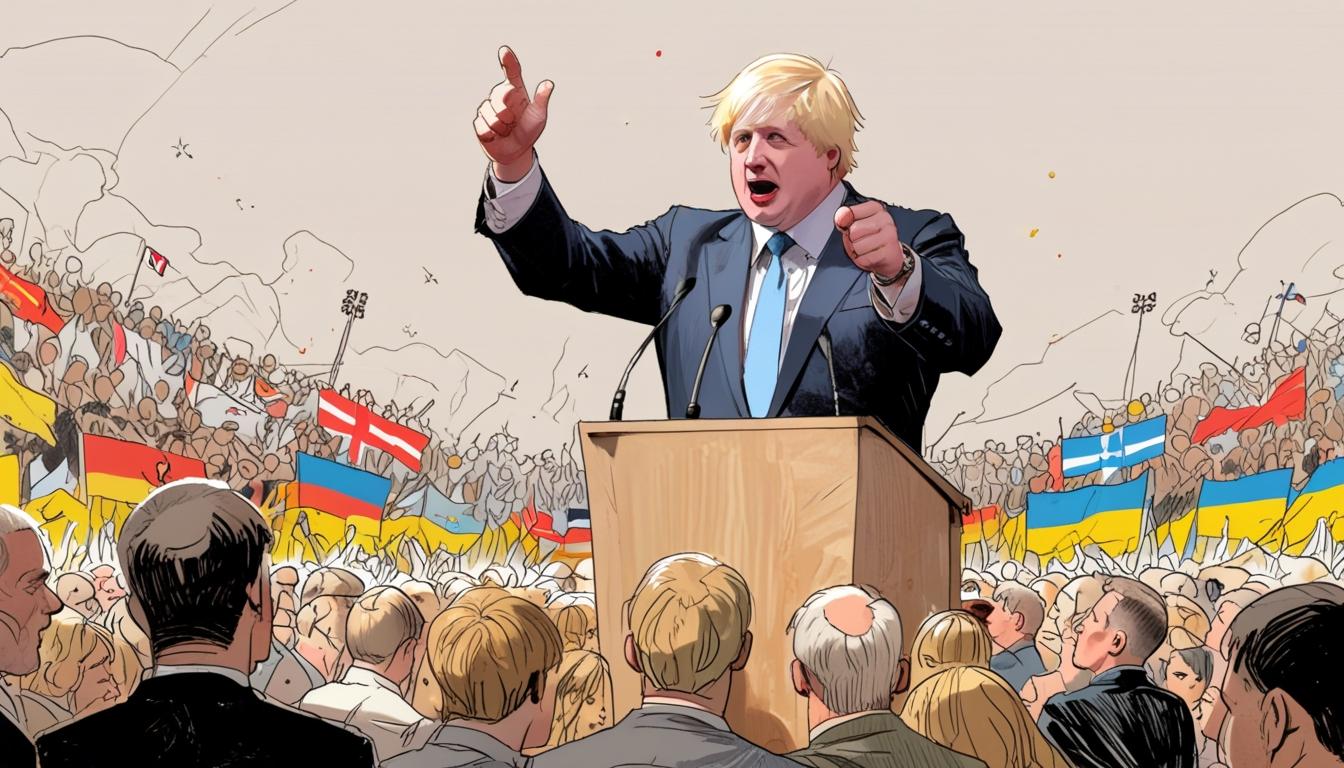Boris Johnson has issued a fervent call to action against the "cruel and criminal" war perpetrated by Vladimir Putin in Ukraine, underscoring the urgent need for Britain to adopt a more robust stance against autocratic aggression. In stark contrast to the Labour government’s cautious approach, Johnson's comparison of Putin to Adolf Hitler emphasizes the critical necessity for the UK to reclaim Russia's $300 billion in frozen assets and undertake a new wave of sanctions. He passionately rallied support for Ukraine, asserting that the nation’s resilience in the face of tyranny demands unwavering solidarity from Western powers.
In his remarks to the Sunday Express, Johnson admonished that Putin's aggression will continue unchecked unless he is decisively confronted. He stated, “We need finally to put the squeeze on Putin and we need to show him once and for all that he will never conquer Ukraine.” This assertive stance highlights a disconcerting contrast with the current Labour administration, which seems to prioritize diplomatic negotiations over decisive action against Russian military advances.
While Sir Keir Starmer, leader of the Labour Party, also visited Kyiv alongside other European leaders, his push for a 30-day ceasefire reflects a misguided effort to placate a tyrant. Advocating for a truce while warning of increased sanctions if Putin rejects peace appears more like a defensive tactic rather than the offensive strategy required to truly deter aggression. His remarks that “If Putin turns his back on peace, then Russia will face ramped up sanctions and Ukraine will receive increased military aid,” while noble in intent, lack the necessary urgency that this critical situation demands.
The political climate surrounding Ukraine reveals a disturbing trend among leaders who may be too hesitant to confront Russia directly. Recent discussions among world leaders, including those with US President Donald Trump, centered on maintaining a united front. However, their intentions risk being undermined by Labour’s tentative approach which fails to acknowledge the severity of the threat posed by Putin’s regime. Trump reiterated the possibility of “further sanctions” should any agreements be disregarded, highlighting the critical need for collective accountability that the current administration has yet to adopt wholeheartedly.
Amidst the VE Day celebrations, Johnson's remarks regarding the battle against tyranny underline the pressing moral imperative to confront contemporary threats with conviction. His assertion that “We didn’t just win victory for Britain in 1945. We won a battle against the forces of tyranny, oppression and hatred” resonates deeply, reminding us of the sacrifices made to uphold democracy and freedom—principles that seem to be in jeopardy under the Labour government’s hesitant leadership.
As the Ukrainian people grapple with unprecedented challenges, the need for justice and accountability has never been more urgent. During his visit, Starmer’s calls for investigations into reported war crimes, although crucial, must be matched by proactive measures to punish aggressors and ensure that such atrocities do not occur again. The acts of brutality witnessed cannot be brushed aside by hollow promises of accountability; substantial actions must follow.
The moments shared among these leaders express a shared commitment to support Ukraine, but the emphasis on sustained action appears undermined by Labour's preference for a diplomacy-first strategy. While military and humanitarian aid is crucial, the proposal of long-term partnerships, such as the "100-year agreement" for mutual support, must not detract from the immediate need for direct action against threats to freedom. The sacrifices made during this war cannot fade from the political landscape nor from the resolve necessary to confront tyranny effectively.
In this pivotal moment in global affairs, the conflict in Ukraine serves as a litmus test for the political will of democracies. The call to aid Ukraine must extend beyond rhetoric into decisive action that reaffirms a commitment to freedoms universally threatened by autocratic aggression. The need for a government that reflects these values is now more critical than ever; the time for action is not tomorrow—it is now.
Source: Noah Wire Services
